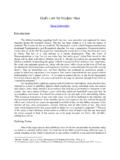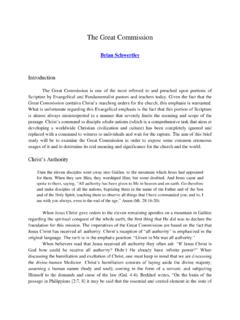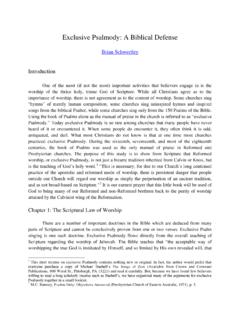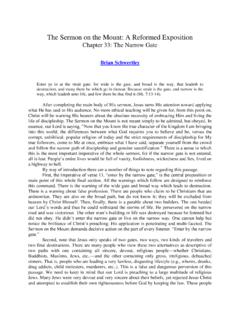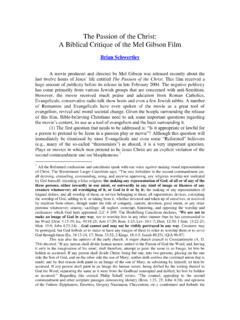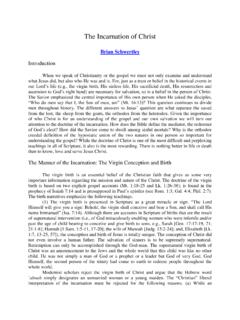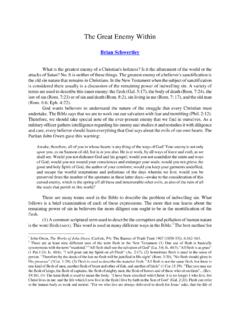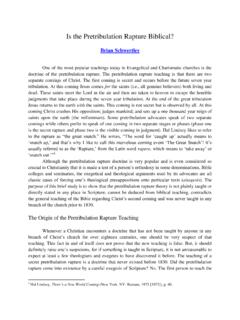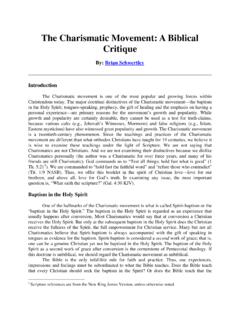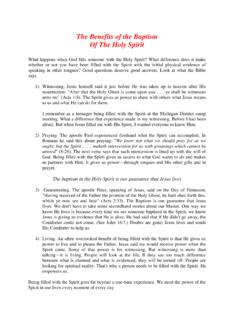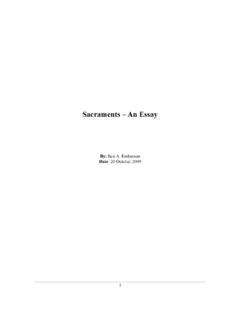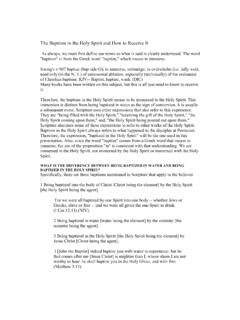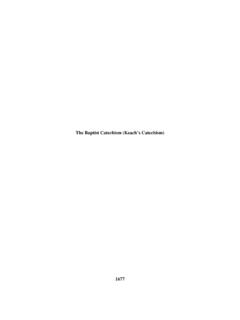Transcription of The Sacraments: A Reformed Perspective Chapter 1 ...
1 The sacraments : A Reformed Perspective Chapter 1: Introduction to the sacraments Brian Schwertley The sacraments are an important and unique means of sanctification within Christ s church. The study of the sacraments is important because: (a) They were instituted by Christ Himself (Mt. 28:18-20) and are church ordinances in which all believers are required to participate. (b) Christians need to understand what they are observing and doing. They need to know why the sacraments are important. A biblical understanding of the sacraments will help us fully benefit from what we are doing; will help us avoid taking sacraments for granted and will help us avoid ritualism or externalism. The sacraments are a means of grace. However, they are not a means of grace apart from faith, and faith presupposes knowledge and understanding.
2 (c) There are many erroneous and dangerous views of the sacraments within professing Christendom. The biblical or Reformed view of the sacraments must be defended against the assaults of ritualism, sacramentalism or sarcedotalism as well as Anabaptism and American individualism. While the sacraments are in a sense very simple, they are also deep and profound. As we study the sacraments we will first consider the sacraments in general. Then we will turn our attention to the specifics of each sacrament: baptism and the Lord s supper. What Does the Term Sacrament Mean? The word sacrament is used almost universally among Christians to describe the ordinances of baptism and the Lord s supper. The term, which is not found in our English Bible, comes from the Latin word sacramentum.
3 ( It is derived from sacro, re, to make sacred, dedicate to gods or sacred uses 1). In ancient times the word referred to a pledge of money by two parties which occurred in a sacred place. In ancient Rome various gods were invoked when swearing a solemn oath. But it is used peculiarly to denote a military oath by which soldiers bound themselves by a certain rite and prescribed words to the state and the magistrate, that they would strenuously perform what the emperor had commanded and would not desert the military standard. 2 The post apostolic church employed the term to signify any sacred rite or mysterious doctrine. Hence everywhere in the [church] fathers you will find the sacrament of the Trinity, of the incarnation, and of faith, and in the general whole Christian religion comes under this name.
4 3 In the Latin Vulgate the word is used to translate the word mystery (Gk. mysterion) in a number of passages ( , Eph. 1:9; 3:9; 5:32; Col. 1:27; 1 Tim. 3:16; Rev. 1:20; 17:7) even though the word mystery is never used to describe baptism or the Lord s supper. Perhaps the best New Testament definition of a sacrament is found in Romans 4:11 where Paul describes the Old Covenant sacrament of circumcision. He writes, And he [Abraham] received the sign of circumcision, a seal of the righteousness of the faith which he had while still uncircumcised. The best modern definition is found in the Westminster Larger 1 A. A. Hodge, Outlines of Theology (Grand Rapids: Zondervan, [1860, 70] 1972), 588.
5 2 Francis Turretin, Institutes of Elenctic Theology (Philipsburg, NJ: Presbyterian and Reformed , 1997), 3:338. 3 Ibid. Catechism which affirms that [a] sacrament is a holy ordinance instituted by Christ in his church, to signify, seal, and exhibit unto those that are within the covenant of grace, the benefits of his mediation; to strengthen and increase their faith, and all other graces; to oblige them to obedience; to testify and cherish their love and communion one with another; and to distinguish them from those that are parts of a sacrament are two; the one an outward and sensible sign, used according to Christ's own appointment; the other an inward and spiritual grace thereby signified (A. 162 and 163). Berkhof s brief definition is helpful.
6 He writes, A sacrament is a holy ordinance instituted by Christ, in which by sensible signs the grace of God in Christ, and the benefits of the covenant of grace, are represented, sealed, and applied to believers, and these in turn, give expression to their faith and allegiance to God. 4 The Word of God and the sacraments as Means of Grace In the Westminster Standards the sacraments are listed among others as a means of grace. The Larger Catechism reads: The outward and ordinary means whereby Christ communicates to his church the benefits of his mediation, are all his ordinances; especially the Word, sacraments , and prayer; all which are made effectual to the elect for their salvation (A. 154; see Shorter Catechism A. 88). Our understanding of the sacraments will benefit if we examine the sacraments in relation to the Word.
7 The Word and the sacraments have a number of things in common. (1) Both were instituted by God as a means of grace. (2) Both point men to the person and work of Christ. (3) Both can only benefit man if they are appropriated by faith. This is the only way in which a sinner can become a participant of the grace that is offered in the Word and in the sacraments . 5 (4) Both are applied to the heart of man by the Holy Spirit. Ridgeley writes, As God works grace by and under them, they are called means of grace; as he seldom works grace without first inclining persons to attend on him in them, and wait for his salvation, they are called the ordinary means of grace; and as they have not in themselves a tendency to work grace, without the inward and powerful influences of the Holy Spirit accompanying them, they are distinguished from it, and accordingly styled the outward means of grace.
8 6 Shedd writes, They are a means of grace, dependent like the other means upon the accompanying operation of the Holy Spirit and consequent faith in the soul of the recipient. Says Calvin (Inst. IV. xiv. 9), All the energy of operation belongs to the Spirit, and the sacraments are mere instruments which without his agency are vain and useless, but with it, are fraught with surprising efficacy. The grace which is exhibited in or by the sacraments is not conferred by any power in them; neither doth the efficacy of a sacrament depend upon the piety or intention of him that doth administer it, but upon the work of the Spirit. Westminster Confession, XXVII. iii. Matt. 3:11, I indeed baptize you with water, but he shall baptize with the Holy Ghost. 1 Cor.
9 11:28, Let a man examine himself and so let him eat. Rom. 2:28, Neither is that circumcision which is outward. 1 Pet. 3:21, The antitype whereunto, namely baptism, doth also now save us (not the 4 L. Berkhof, Systematic Theology (Grand Rapids: Eerdmans, 1939), 617. 5 Ibid, 616. 6 Thomas Ridgeley, Commentary on the Larger Catechism (Edmonton, AB: Canada [1855] 1995), 2:433. putting away of the filth of the flesh, but the answer of a good conscience towards God), by the resurrection of Jesus Christ. 7 (5) Both the preached word and the sacrament of the Lord s supper are public ordinances. That is, they are only lawfully found in public worship and are only lawfully conducted by ordained ministers of the gospel. In all places where I record my name, I will come unto thee, and I will bless thee (Ex.)
10 29:24, KJV). Turretin writes, The less principal is that they may be badges of a public profession and of divine worship by which they who belong to the visible church are distinguished from other assemblies. Hence it is evident how great is the philanthropy (philanthr pia) of God, who, letting himself down as it were to us creeping upon the ground, wishes to seize not only our minds but also our external senses with the haste and admiration of his grace, inasmuch as he subjects it to the bodily senses, to the hearing in the spoken word, to the touch and sight in the sacraments . 8 The Word of God is indispensable to public worship and must be read, preached and sung ( , the Psalms) at every service. Although the sacraments are commanded by God and thus are necessary, they are not absolutely indispensable to every public worship service.
